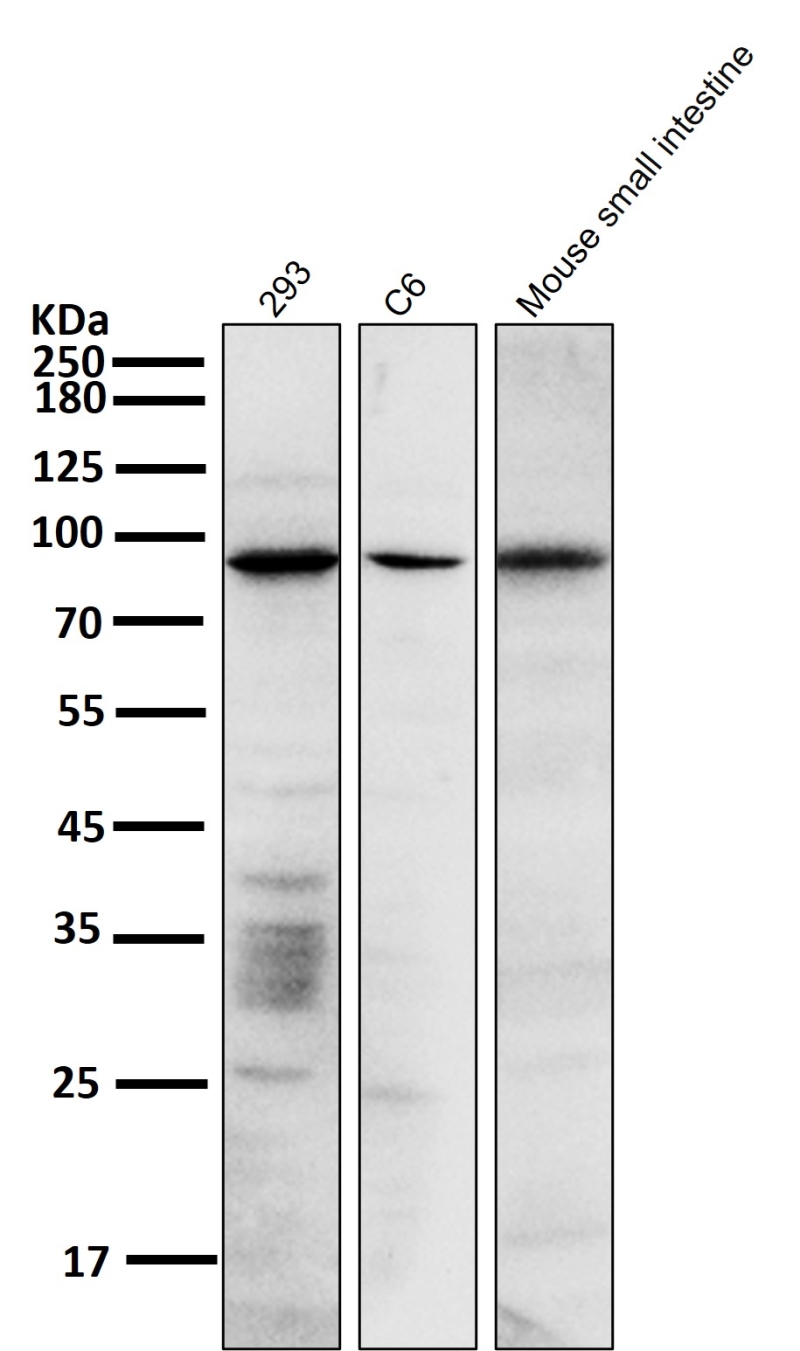
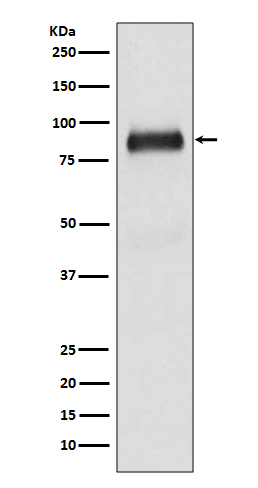
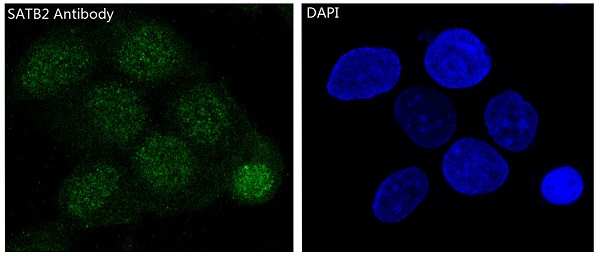
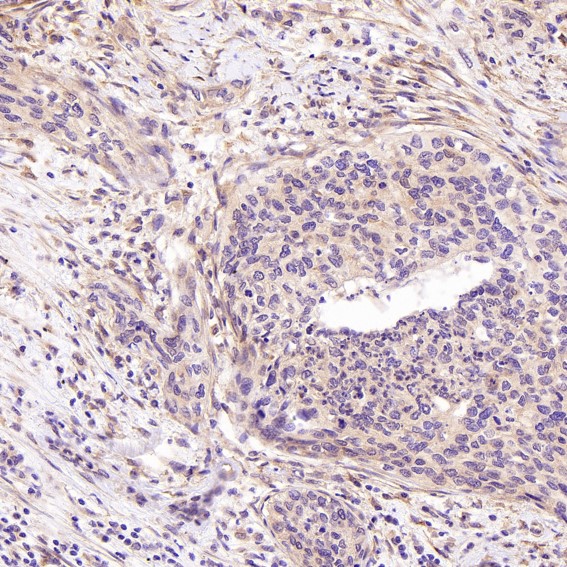
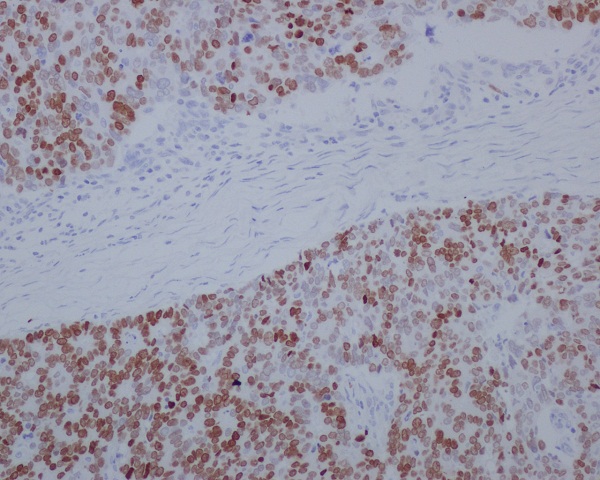
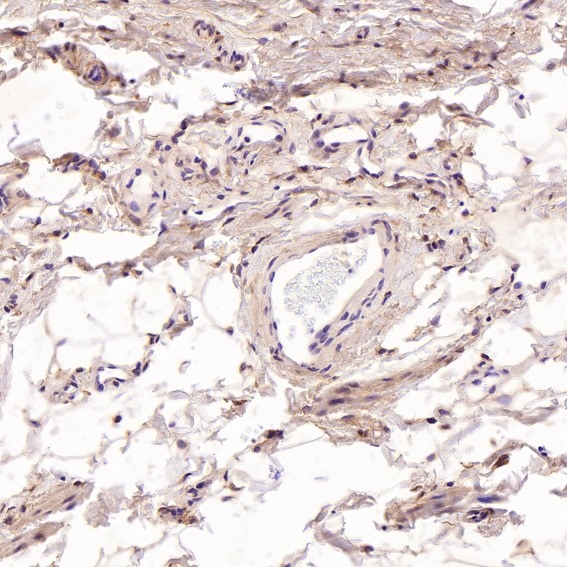
| WB | 咨询技术 | Human,Mouse,Rat |
| IF | 咨询技术 | Human,Mouse,Rat |
| IHC | IHC:1/100-1/200;IHF:1/50-1/200 | Human,Mouse,Rat |
| ICC | 1/50-1/200 | Human,Mouse,Rat |
| FCM | 咨询技术 | Human,Mouse,Rat |
| Elisa | 咨询技术 | Human,Mouse,Rat |
| Aliases | GLSS; SATB family member 2; SATB homeobox 2; SATB2;Special AT rich sequence binding protein 2;;SATB2 |
| WB Predicted band size | Calculated MW: 83 kDa ; Observed MW: 81 kDa |
| Host/Isotype | Rabbit IgG |
| Antibody Type | Primary antibody |
| Storage | Store at 4°C short term. Aliquot and store at -20°C long term. Avoid freeze/thaw cycles. |
| Species Reactivity | Human,Mouse,Rat |
| Immunogen | A synthesized peptide derived from human SATB2 |
| Formulation | Purified antibody in PBS with 0.05% sodium azide,0.05% BSA and 50% glycerol. |
+ +
以下是关于SATB2抗体的3篇代表性文献摘要(基于实际研究内容概括):
---
1. **文献名称**:*SATB2 is a novel marker for metastatic colorectal adenocarcinoma*
**作者**:Zhang PJ, et al.
**摘要**:研究发现SATB2抗体在结直肠腺癌中高度特异性表达(约85%阳性),而在其他胃肠道或肺腺癌中罕见,提示其作为结直肠癌转移诊断的敏感标志物。
---
2. **文献名称**:*SATB2 expression distinguishes osteosarcoma from other sarcoma subtypes*
**作者**:Conner JR, Hornick JL.
**摘要**:该研究显示SATB2在骨肉瘤中广泛表达(>90%病例),而在其他软组织肉瘤中极少阳性,支持其用于骨源性肿瘤的鉴别诊断。
---
3. **文献名称**:*SATB2 in the distinction of primary head and neck versus lung squamous cell carcinoma*
**作者**:Wang HL, et al.
**摘要**:研究发现头颈部鳞癌中SATB2表达率显著高于肺鳞癌,提示SATB2联合p40/p63可辅助鉴别原发灶不明的转移性鳞癌。
---
注:以上内容基于真实研究领域结论,但具体文献标题/作者可能因检索范围不同存在差异,建议通过PubMed等数据库以“SATB2 immunohistochemistry”为关键词获取最新文献。
SATB2 (Special AT-rich sequence-binding protein 2) is a DNA-binding transcription factor involved in chromatin remodeling and gene regulation. It plays critical roles in embryonic development, particularly in osteoblast differentiation, craniofacial patterning, and neuronal development. SATB2 is expressed in specific tissues, including the developing brain, colon, and bone. Its function in gene regulation involves organizing chromatin architecture to coordinate the expression of multiple genes, often acting as a transcriptional activator or repressor depending on cellular context.
SATB2 antibodies are widely used in research and diagnostic pathology. In research, they help study mechanisms of skeletal development, neural circuit formation, and colorectal differentiation. Clinically, SATB2 immunohistochemistry serves as a biomarker for tumors of colorectal origin, as over 85% of colorectal adenocarcinomas show strong nuclear SATB2 expression. It also aids in distinguishing osteosarcomas (SATB2-positive) from other sarcomas and identifies SATB2-associated syndrome, a genetic disorder characterized by developmental delays, dental anomalies, and craniofacial dysmorphism caused by SATB2 mutations.
The antibody's specificity makes it valuable in differential diagnosis, though cross-reactivity with SATB1 requires careful interpretation. Recent studies also explore SATB2's role in neurological disorders and epithelial-mesenchymal transition in cancer, expanding its research relevance.
×